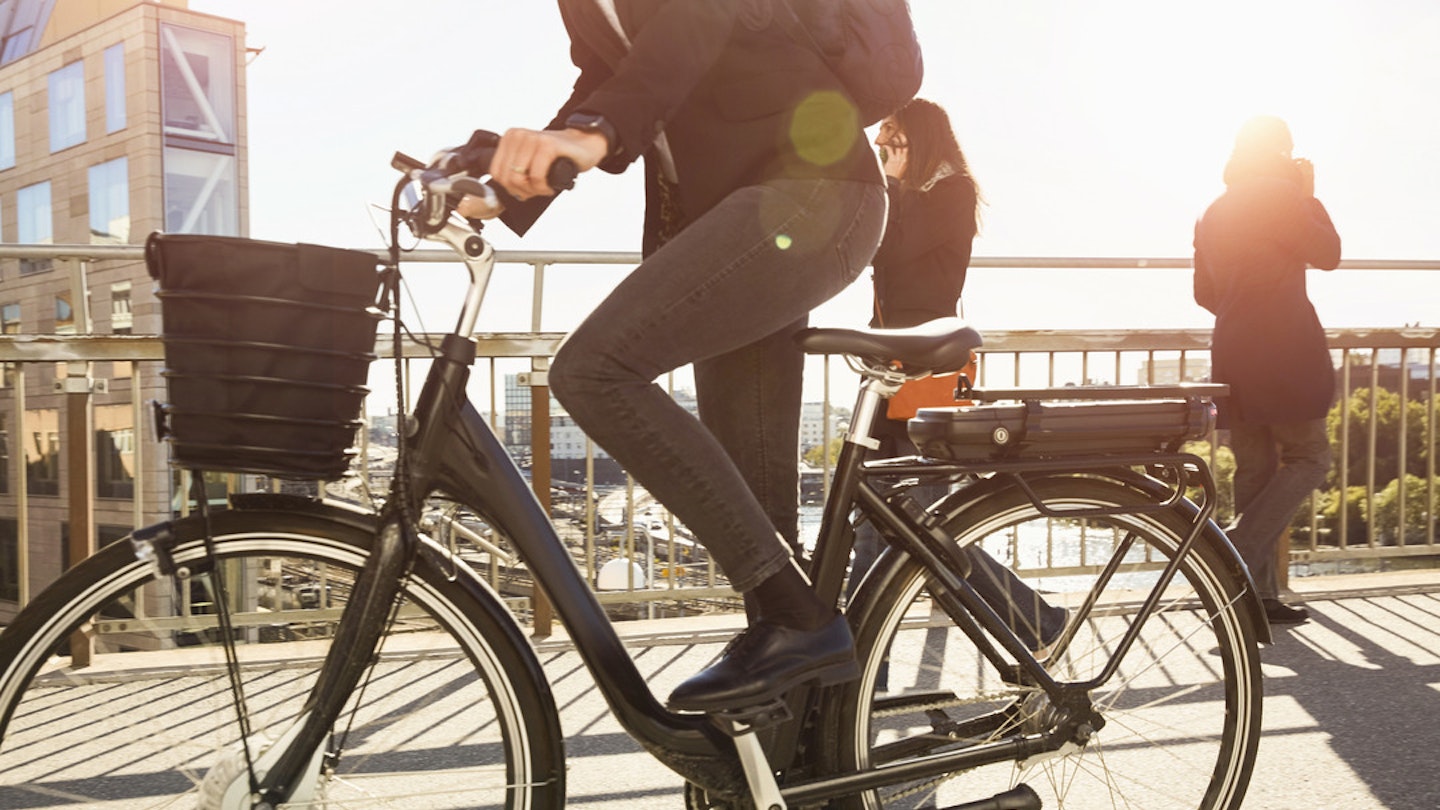Regarding electric bikes and, more specifically, budget electric bikes, you may need to adjust your parameters to what you describe as ‘budget’.
Let's look at a standard bike which doesn’t have electric motors and batteries - a ‘budget’ option here might be under £1,000. In the world of eBikes, once you have that initial basic cost of a bike, you need to start adding batteries and motors. You can easily add another £1,000 to the price, depending on what type of battery and motor you go for.
The best budget electric bikes at a glance:
• Best overall budget electric bike: Electric City Bike ELOPS 120e Low Frame - View offer on Decathlon
• Best budget motor: Pendleton Somerby E - Mint 2021 - Electric Hybrid Bike - View offer on Tredz
• Best budget electric bike for range: Raleigh Stow-E-Way Electric Folding Bike 2022 - View offer on Halfords
• Best budget electric bike for additions: Raleigh Array Crossbar Electric Hybrid Bike 2022 - View offer on Tredz
There are different types of batteries and motors, each has its benefits and downsides, and there are, of course, motors at the bottom of the range which are cheaper and those at a higher range which are more expensive. The challenge on a budget eBike is to find a frame and bike which has good specs and is coupled with a motor and batteries that make it worthwhile.
A budget eBike will likely cost you between £1,000 - £2,500, but the upside is that the durability of the motors, batteries and frames means that this could be a bike you buy for the rest of your time riding. You can still find a quality eBike for under £1,000, but the selections on this list tend to outclass them.
The best budget electric bikes
Best overall budget electric bike
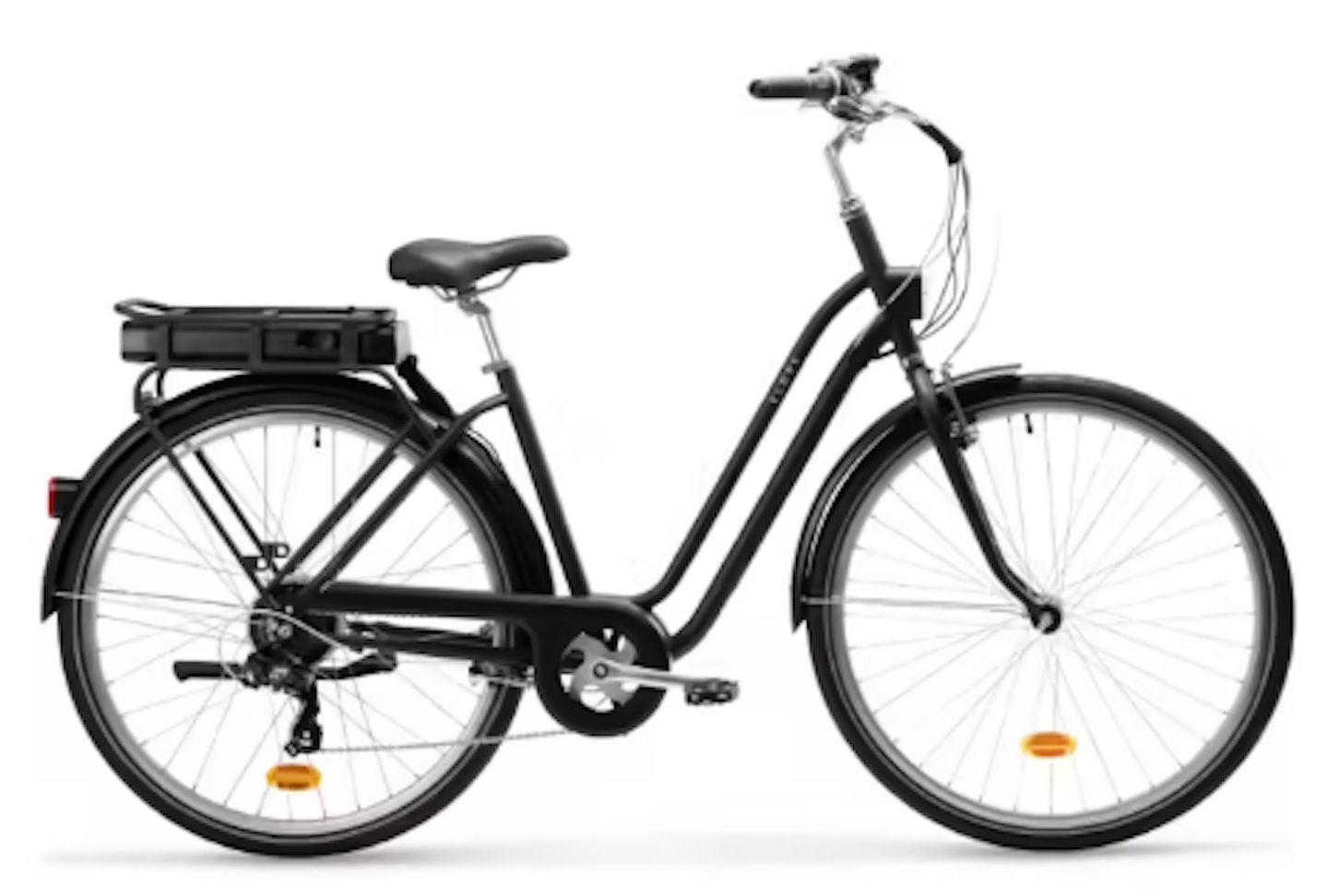
www.decathlon.co.uk
It is possible to make eBikes cheaply, as Decathlon shows here with the ELOPS 120e. The low step-through frame makes getting on and off the bike easy, and the 36v brushless motor offers up to 250 watts of additional power and 35Nm of torque.
The motor offers three different modes; Eco, Normal, and Sport, each making the motor stop working at different speeds, 15km/h, 22km/h and 25km/h. This is different to the way most eBikes work as they usually offer up various power bands, as opposed to speeds. The Samsung Lithium-ion battery has a 313Wh capacity, so depending on which mode you use, it can give you up to 50km of range.
Pros
- Low cost
- Simple design
Cons
- V-brakes offer the least amount of stopping power
| Motor: | Not described, brushless 36v rear wheel motor |
| Batteries: | 36V Samsung Batteries |
| Range: | up to 50 km |
| Gearing: | Shimano 6-Speed |
| Brakes: | V-Brakes |
| Integrated accessories: | Mudguards, Lights, Kickstand |
- Brushless 36 volt rear wheel motor, 250 Watt max power
- 35 Nm maximum torque
- An LED control console is right next to your left grip
- Very reliable 36V 8.7Ah LG/Samsung lithium-ion cell with a 313Wh capacity
- The range of a battery with a 313Wh capacity is at least 20 km (mode 3 - SPORT) and up to 50 km (mode 1 - ECO)
- Frame weight = 7.2 kg
- Front and rear TEKTRO V-brakes with replaceable pads
- AXA battery-powered front and rear LED lights
- 700x44 low-pressure tyres to smooth out bumps
Best budget motor
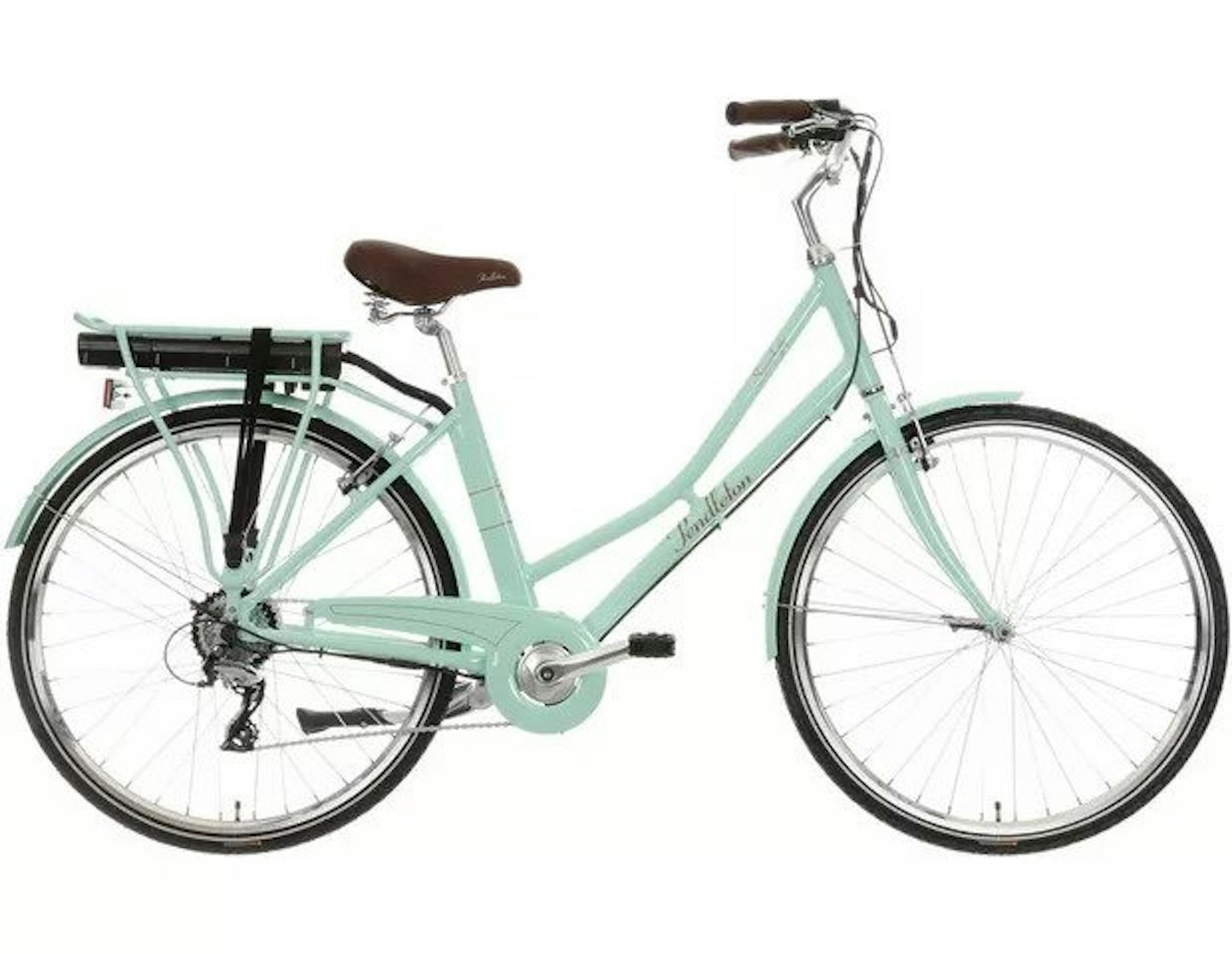
www.tredz.co.uk
Taking an already low-priced bike and putting a low-priced eBike motor on is one way to ensure you get a budget option. The Pendleton Somerby doesn’t have the highest specs and carries through to the eBike version.
However, for getting about town at relatively low speed, the Tektro V-brakes will suffice, and an 8-speed Shimano Acera cassette (13T – 32T) means you won’t be going at high speed anyway, especially when combined with the bike's 22kg weight. You won’t be setting records on too many Strava segments riding it.
The Bafang 36V 250W motor is similar to that which you can buy from Amazon, and utilising 317Wh Samsung batteries, it should give you up to 50 miles of range with three different assist levels.
Pros
- Excellent budget motor
- Shimano Acera gears
- Integrated mudguards
Cons
- V-brakes aren’t the best
- A hefty bike
| Motor: | Bafang 36V 250W motor |
| Batteries: | 317Wh Samsung Cells |
| Range: | up to 50 miles |
| Brakes: | V-brakes |
| Gearing: | Shimano Acera |
| Integrated accessories | Mudguards |
- Lightweight aluminium step-through frame
- Tektro V-Brakes for easy maintenance
- Shimano Acera 8 speed gearing for smooth and consistent shifting
- Kenda, Anti Puncture tyres to limit punctures
- Full-length metal mudguards, chainguards and luggage rack
- Sizes: 17", 19"
Best budget electric bike for range
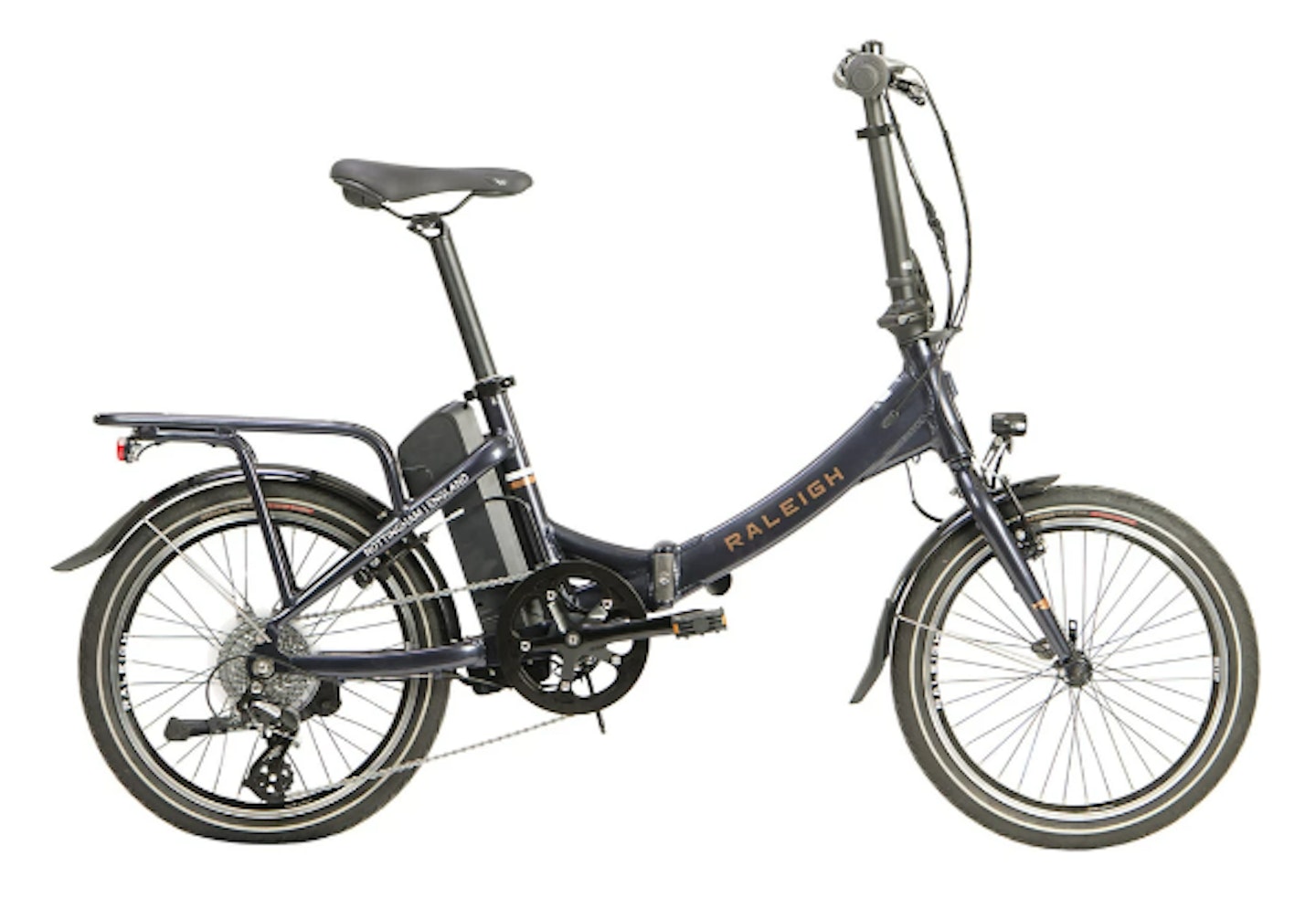
www.halfords.com
Perfect for the city commute, this Raleigh bike uses a TranzX F15 motor, good for 250 watts of power and a TranzX 250Wh 36V battery that has a range of up to a maximum of 30 miles, depending on how you use it.
If you’re short on space and fancy an eBike which will pack down and be stored in your home or next to your desk, this could be for you.
One way Raleigh can keep its cost low is to use products which are ‘Raleigh approved’. However, there is some confidence you can take from this in that Raleigh is a reputable brand. They’re unlikely to use products which would damage that reputation, and Sigma Sports is a reputable dealer.
Pros
- Respected brand
- Descent range from a small battery
- Perfect for city life
Cons
- eBikes are heavy – this one weighs 20kg which is a lot for a folding bike
| Motor: | TranzX F15 motor |
| Batteries: | TranzX 250Wh 36V battery |
| Range: | Up to 50km |
| Brakes: | V-brakes |
| Gearing: | Raleigh-approved 7-speed, 14-34T |
| Integrated Accessories: | K<span style="font-family: inherit; font-size: inherit; font-weight: inherit; color: initial;">ickstand, mudguards and a rear pannier rack</span> |
- The Raleigh Stow-E-Way is both a proper folding bike and a proper e-bike with a strong but light frame
- The bike can be folded to a convenient 880mm x 800mm x 440mm
- powerful rear wheel motor
- TranzX system has 4 support levels
- Handle-mounted power controls are placed close to the grips
- The 260wh battery will provide a range of up to 50km
- The Stow-E-Way is a fully equipped bike complete with a kickstand, mudguards and a rear pannier rack
- 20" diameter wheels have been specifically selected to offer the best balance between practicality and folded size
- A wide range of smooth shifting 8 speed Shimano gears
Best budget electric bike for additions
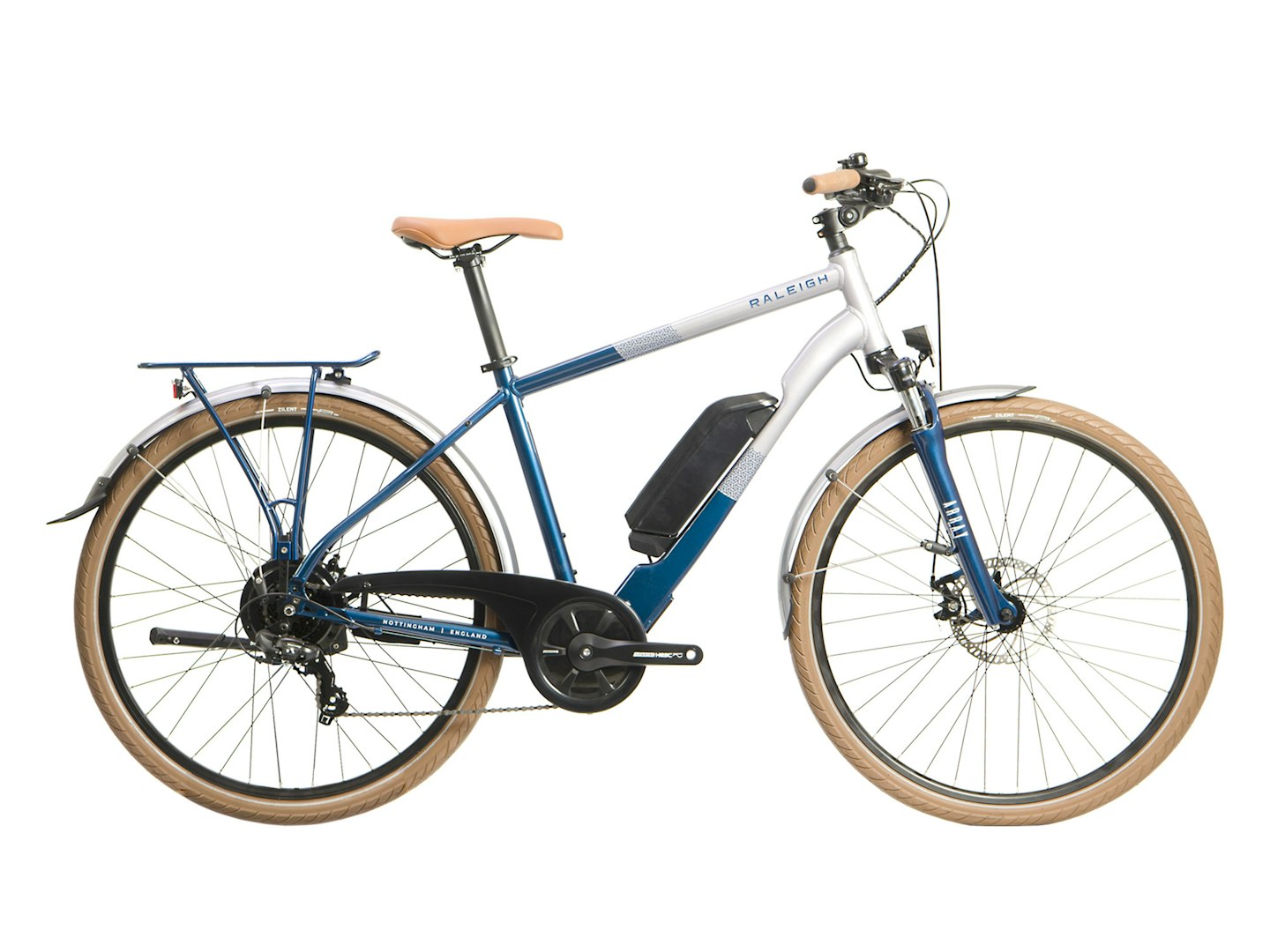
www.tredz.co.uk
Mechanical disc brakes offer decent stopping power, while 7-speed Shimano gears provide everything you need to get you around town. A powerful 250-watt Contour Canbus E24 motor will give you all the boost you need; with a 400Wh battery pack giving you up to 60 miles of range, there will be no stopping you.
Pros
- Looks great
- Reliable brand from a respectable online seller
- Equipped with mudguards, lights, pannier racks
Cons
- 23kg of weight makes it a hefty bike
| Motor: | Suntour Canbus E25 |
| Batteries: | Suntour Canbus 400Wh |
| Range: | Up to 60 miles |
| Brakes: | Tektro MD-M280 Mechanical disc brakes |
| Gearing: | Shimano HG200, 7-speed, 12-28T |
| Integrated accessories: | Mudguards, lights, kick stand |
- Boasting a range of 60 miles on a single charge depending on level of assistance selected.
- 400Wh removable battery pack
- The super-quiet and discreet Suntour motor delivers all the oomph you need
- Four power levels of electrical assistance
- OLED Suntour control panel shows all the stats you could ever need
- Easily flick between the three different assistance modes at the push of a button on the handlebar.
Best budget electric bike for brakes
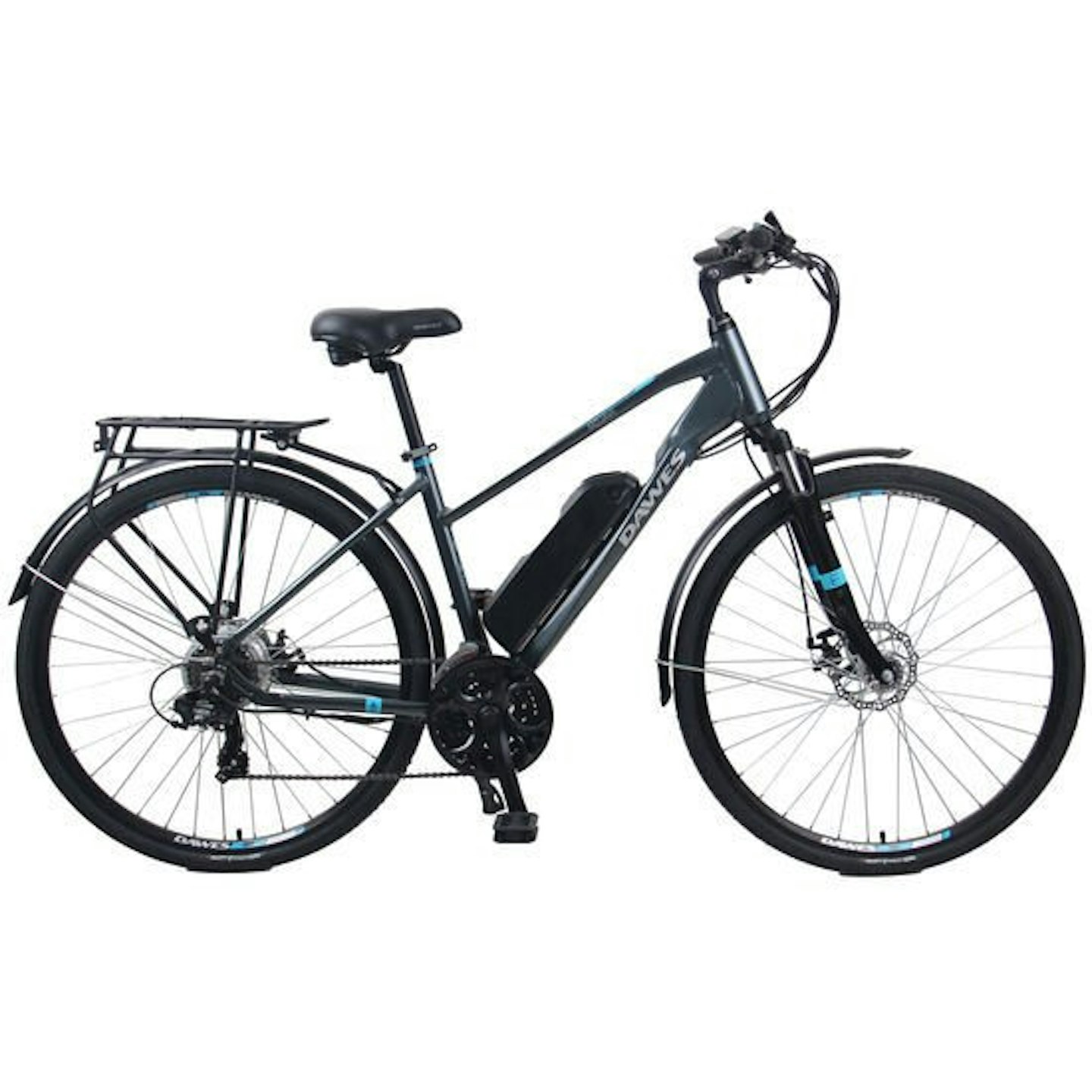
www.tredz.co.uk
Dawes has combined a low-cost Bafang motor with a 360Wh battery pack to deliver around the 45km range. This is a perfect rider for the kids to soak in the countryside as you pootle along electrically assisted. The low-rise MTB bars and front suspension mean wooded trails shouldn’t be too difficult.
Mechanical disc brakes offer more stopping power than the previously mentioned V-brakes, and a smooth 7-speed Shimano gearset should easily see you up moist hills.
The Bafang Motor is in the bike’s rear hub, so while this offers less torque and initial speed, it’s more lightweight and much more discrete.
Pros
- Disc brakes
- Suspension
- Shimano gears
Cons
- Still heavy at 20kg
| Motor: | Bafang 36V 250W motor rear hub motor |
| Batteries: | 360Wh (36V 10Ah) |
| Range: | Not Given |
| Brakes: | Mechanical disc brakes |
| Gearing: | Shimano 7-speed freewheel, 14-28T |
| Integrated Accessories | Mudguards, Pannier Racks |
Best budget electric bike for gears
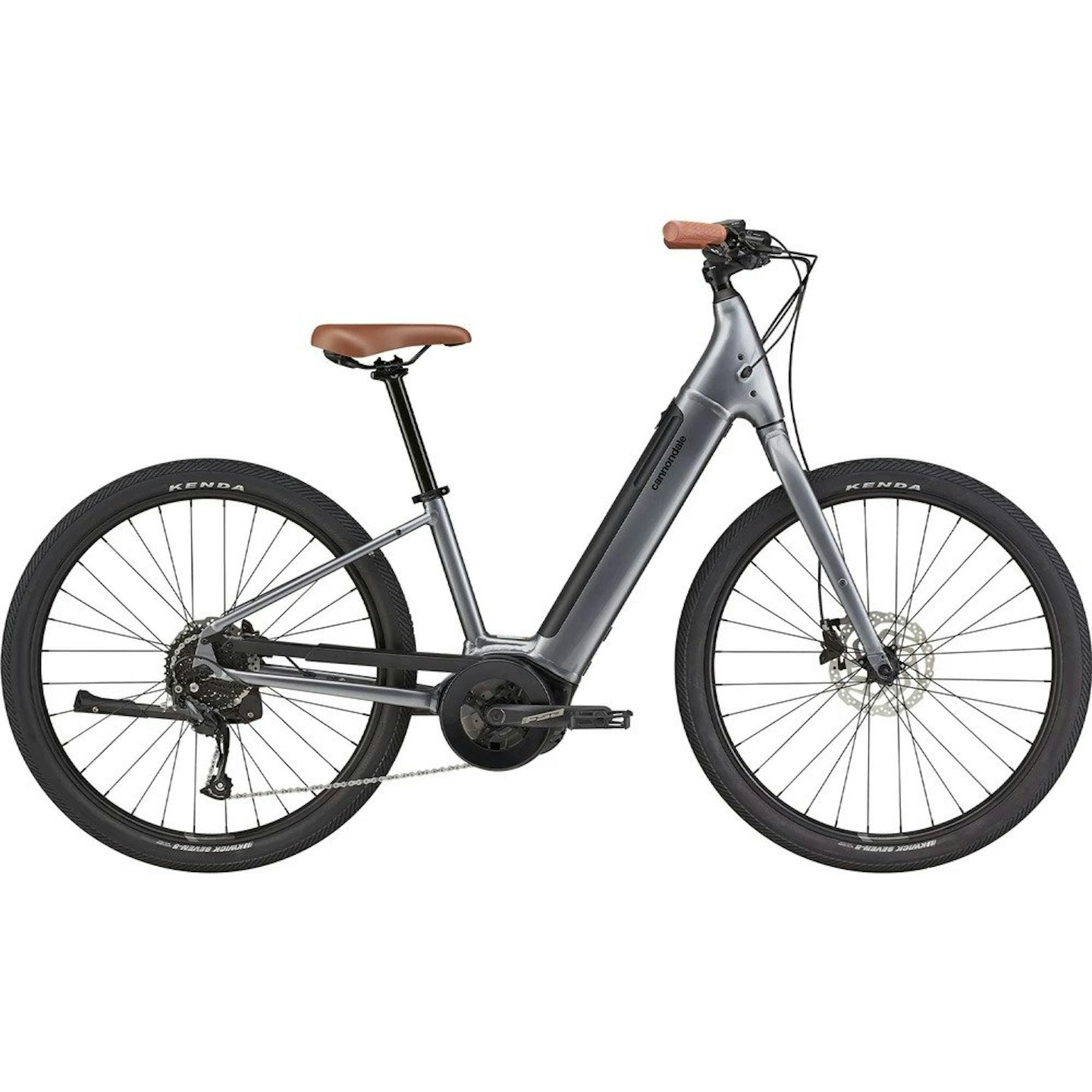
www.tredz.co.uk
Yes, we know the initial cost is high. But you get so much bike for your money that, if you can afford to, this would be the way we would be looking to go if purchasing an around-town bike.
The frame, which has done away with the need for a top tube, offers such easy on-and-off riding, and it looks super classy. Highly respected bike brand Cannondale bring a lot to the party with this bike, like, hydraulic disc brakes, Shimano Altus 9-speed gears, a kickstand and a very powerful Bosch motor, offering a range of up to 120km.
There’s so much to like about this bike.
Pros
- Very respected brand
- Solid gearing
- Massive range
Cons
- High cost, but it offers plenty of specs
| Motor: | Bosch Active Line |
| Batteries: | Bosch PowerTube 400Wh |
| Range: | Up to 120km |
| Brakes: | Tektro M275 hydraulic disc |
| Gearing: | Shimano HG93, 9-speed |
| Integrated accessories: | None |
- SmartForm C3 Alloy step-thru frame
- Bosch Active Line Plus motor and 400Wh battery
- Shimano Altus 9-speed groupset
- Riderever hydraulic disc brakes
- 27.5” Kenda Kwick Seven.5 tyres
Frequently asked questions
There are still plenty of myths and rumours about eBikes, and their legalities, so let’s look at some of the most frequently asked questions and dispel some of these myths.
Is an electric bike right for me?
Yes – both regular bikes and eBikes are suitable for everyone, but the question which should be asked is what kind of bike is right for you.
You wouldn’t buy a two-seater sports car if you needed to drive around two kids and a dog; you would look for something like an estate or an SUV; the same can be said for bikes. If you’re going around town, a more comfortable, relaxed rider like a hybrid electric bike or an urban bike would be suitable, but if you wanted to attack the hills and country lanes, a more road-focused eBike would suit.
eBikes can help people who have lower back problems, knee problems or health concerns because the additional help from an electric motor can elevate the stress on these areas and help increase your riding time.
How to charge an electric bike
Most eBikes have removable batteries, which you plug into a charger, and then you can leave to recharge. Some have a socket on the bike, which you must fit the charger into. This can be a bit more fiddly as you have to have the storage space for a bike near a socket.
How fast do electric bikes go?
All electric bike motors are limited to 15mph – but that does not mean the bike is. Essentially an eBike can go as fast as you can pedal it, but the motor must cut out at 15mph for it to be road-legal in the UK.
Are electric bikes legal?
Yes, as long as your eBike motor does not exceed 15.5mph, they are road-legal in the UK.
What to look for in an eBike:
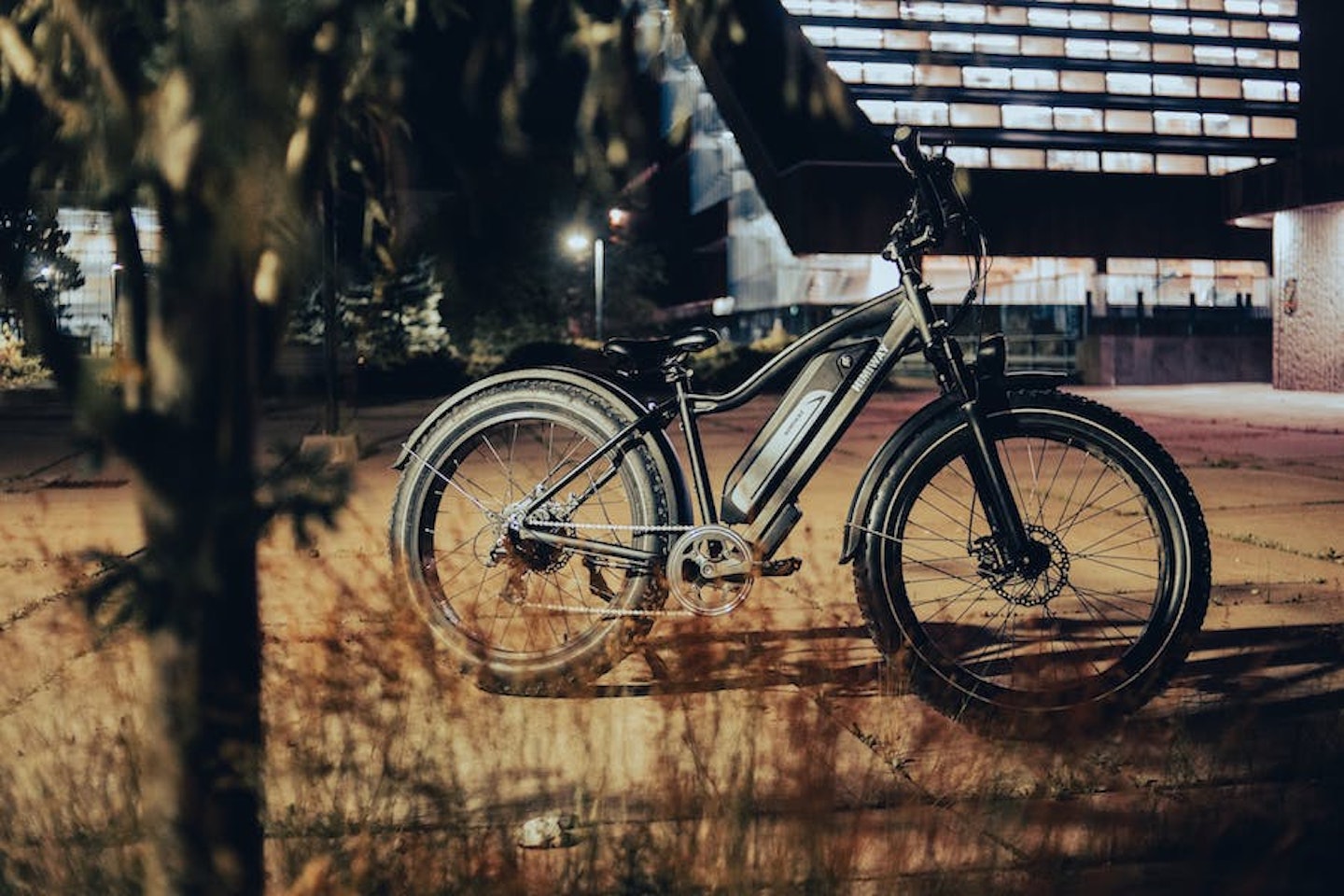
Motors
To ensure you get something that's right for your need, you'll need to pick between two different motors - hub or crank.
Hub motors are mounted in the rear hub and help the wheel to rotate and are often for lighter use of an eBike.
Crank motors help the pedals turn. Having a motor house in the cranks is generally heavier, but they give you more assistance when riding, and you feel their effects much more than a hub motor.
Brakes
You'll be hard pushed to find an eBike which doesn't have disc brakes, as the heavier bikes require the greater stopping power found with disc brakes. These will either be mechanical - the traditional method of a cable pulling the brake calliper - or hydraulic - which uses fluid movement to make the brake calliper shut.
The mechanical systems are fine and work well, but as they're open, dirt and grim can clog these up, with cables becoming stretched over time and needing to be changed.
Hydraulic systems are closed - you get more braking power, so it may only require a couple of fingers to pull hard on the brakes, leaving more room for modulation. The downside to hydraulics is that they're more expensive, are more technical to replace, and often require a mechanic.
Frame
The frame will be something you will have to decide on too. You will get a choice of aluminium or carbon fibre frames. Aluminium is cheaper but tends to be heavier. Lower-end prices will make lighter carbon fibre frames more readily available.
You should balance the weight and cost of what you can afford because the likelihood is you won't mind a couple of extra kilograms on the bike frame if it saves you a couple of grand.
Torque and Watt-hour (Wh)
Torque on an eBike is very similar to a car; the higher the torque a motor can produce, the more weight it can shift. It's not uncommon to find pedal-assist motors that can produce up to 80Nm of torque, and this is plenty to get you off the mark and up the hills.
The difference between a Watt and a Watt-hour (Wh) is that a Watt is a power unit, and Wh is a unit of energy. So, Watt-hours measure the amount of energy for a specific period and Watts measure rates of power at the moment in time. So if you have a 250Wh battery, it will give you 250 watts of power for one hour.
Use this as a rough guide, though, as when you're in the most assisting mode (which usually gives you 250 watts of power), the run time depends on how hard you're working, the steepness of inclines, the amount of weight the bike is carrying and environmental factors, like temperature and wind.
